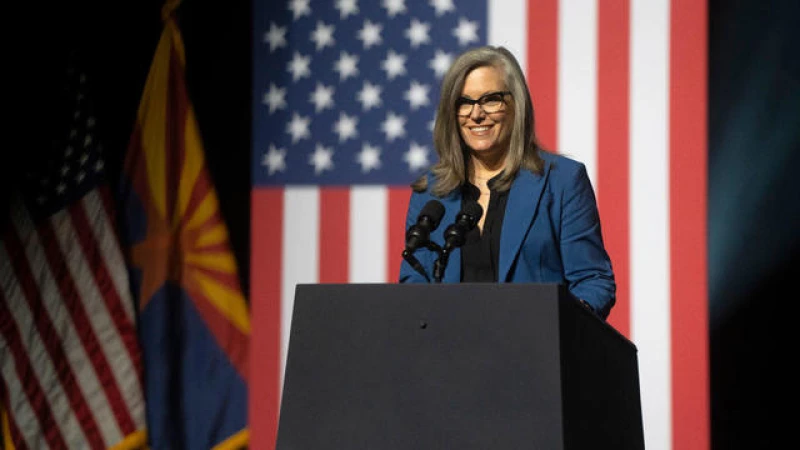Democratic Arizona Gov. Katie Hobbs has relegated a Civil War-era ban on most abortions to the past by signing a repeal bill Thursday.
Hobbs says the move is just the beginning of a fight to protect reproductive health care in Arizona. But the repeal may not take effect until 90 days after the end of the legislative session, in June or July. Abortion rights advocates hope a court will step in to prevent that outcome.
The effort to repeal the long-dormant law, which bans all abortions except those done to save a patient's life, won final legislative approval Wednesday in a 16-14 vote of the Senate, as two GOP lawmakers joined with Democrats.
Hobbs denounced "a ban that was passed by 27 men before Arizona was even a state, at a time when America was at war about the right to own slaves."
"This ban needs to be repealed, I said it in 2022 when Roe was overturned, and I said it again and again as governor," Hobbs said.
The Senate Vote on Abortion Ban in Arizona
Senators engaged in a lengthy debate as the vote on the abortion ban in Arizona extended for hours. The discussions were filled with personal anecdotes, emotional appeals, and even references to biblical teachings. Some senators went as far as to provide graphic descriptions of abortion procedures and played amplified audio recordings of fetal heartbeats. There were also warnings against the perils of "legislating religious beliefs" in a diverse society.
Simultaneously, supporters of abortion rights in South Dakota submitted an overwhelming number of signatures to place an initiative on the fall ballot. In Florida, a new law went into effect banning most abortions after six weeks of pregnancy, a period when many individuals may not even be aware that they are pregnant.
Arizona's Democratic Attorney General Kris Mayes, who opposes the near-total abortion ban, has indicated that the law might not be enforceable until late June. However, a pro-life group, Alliance Defending Freedom, argues that county prosecutors could start enforcing the ban once the Supreme Court's decision is finalized.
The near-total ban in Arizona does not include exceptions for cases of rape or incest. In a recent ruling, the Arizona Supreme Court hinted that healthcare providers could face prosecution under a law dating back to 1864, which carries a prison sentence of two to five years for assisting in abortions.
Repealing the 15-Week Abortion Ban
If the abortion ban in Arizona is repealed, the prevailing law regarding the procedure would revert to a 2022 statute that restricts abortions after 15 weeks of pregnancy. This change would have significant implications for reproductive rights in the state.
Arizona Representative Stephanie Stahl Hamilton, a Democrat known for her role in the battle to overturn the territorial abortion ban, shared how her upbringing on the Navajo Nation shaped her views. Raised by schoolteacher parents, she witnessed the denial of reproductive rights firsthand and saw her sister-in-law endure two challenging pregnancies that ended in stillbirths.
"If this law is enacted, my 17-year-old daughter would have fewer reproductive rights than her great-grandmother in 1940s Texas, who had to seek an abortion," Stahl Hamilton expressed. "There are individuals in urgent need of reproductive healthcare."
President Biden's campaign team perceives the outrage following the Roe v. Wade decision as a potential political advantage in crucial states like Arizona, causing a divide among Republican leaders.
During a Senate session on Wednesday, supporters of the abortion ban in the gallery heckled and disrupted Republican State Senator Shawnna Bolick as she aligned with Democrats in voting for the repeal. Bolick, who is married to State Supreme Court Justice Clint Bolick, faces a retention election in November. Justice Bolick previously ruled in April to reinstate a 1864 abortion law that had been inactive since the Roe v. Wade ruling in 1973.
The 19th-century law, which had been invalidated since the landmark Supreme Court decision, is now a focal point of debate and contention in Arizona's political landscape.
Arizona Abortion Ban Repealed
Following the overturn of Roe v. Wade in June 2022, the 1864 ban on abortion in Arizona has been repealed. Former Arizona Attorney General, Mark Brnovich, successfully argued for the enforcement of the ban, but it remained unenforced during the legal proceedings.
Planned Parenthood Arizona has filed a motion with the state Supreme Court to prevent a halt in abortion services until the Legislature's repeal officially takes effect.
Advocates are currently gathering signatures for a ballot measure that would allow abortions up to 24 weeks, with exceptions for cases where the parent's life or health is at risk.
On the other hand, Republican lawmakers are considering introducing competing abortion proposals for the November ballot.
Dr. Ronald Yunis, a Phoenix-based obstetrician-gynecologist and abortion provider, sees the repeal as a positive step for patients, ensuring they can access necessary healthcare within the state.
"This change will prevent women from having to seek medical care in other states," Yunis stated. "I trust in our governor and attorney general to continue safeguarding women's rights."







